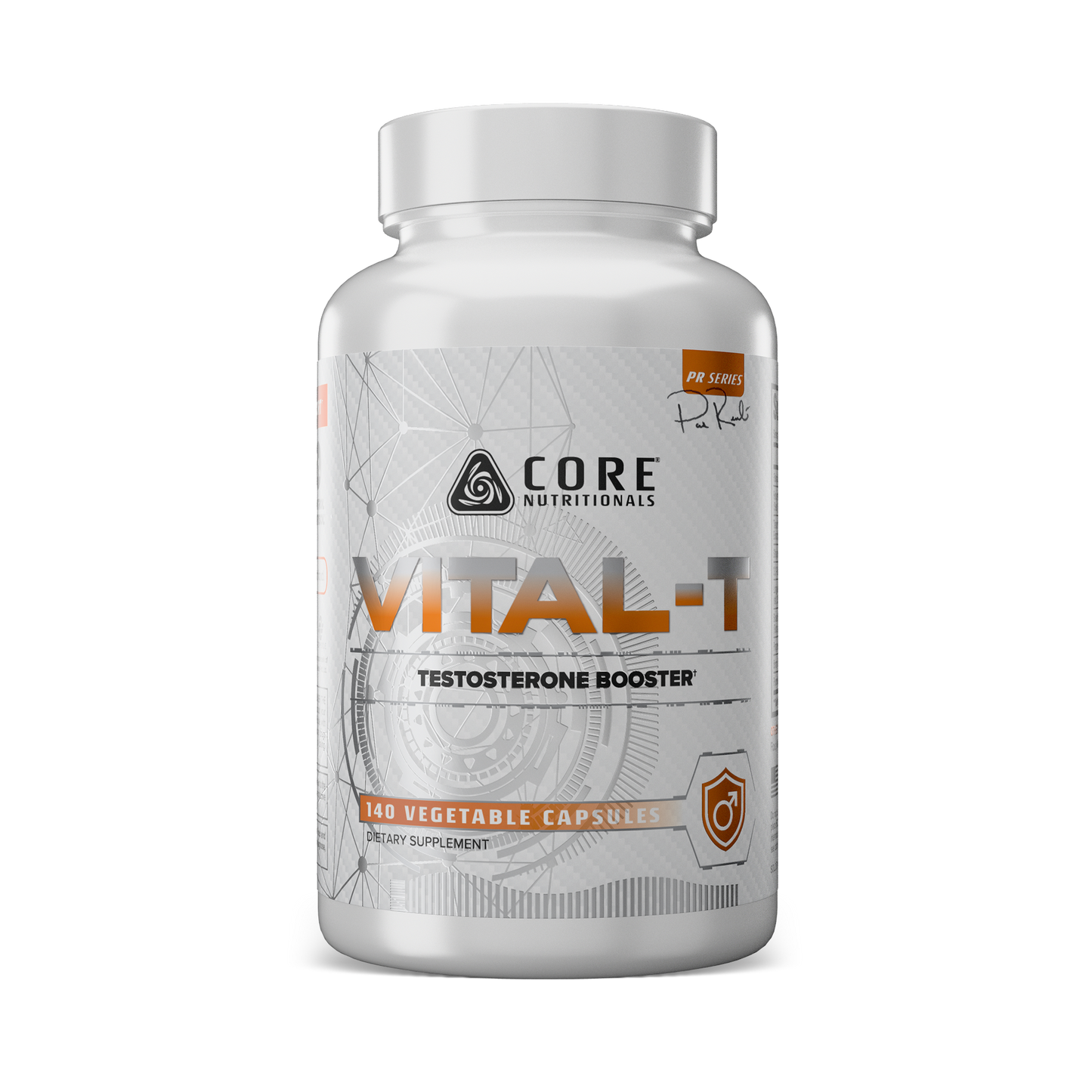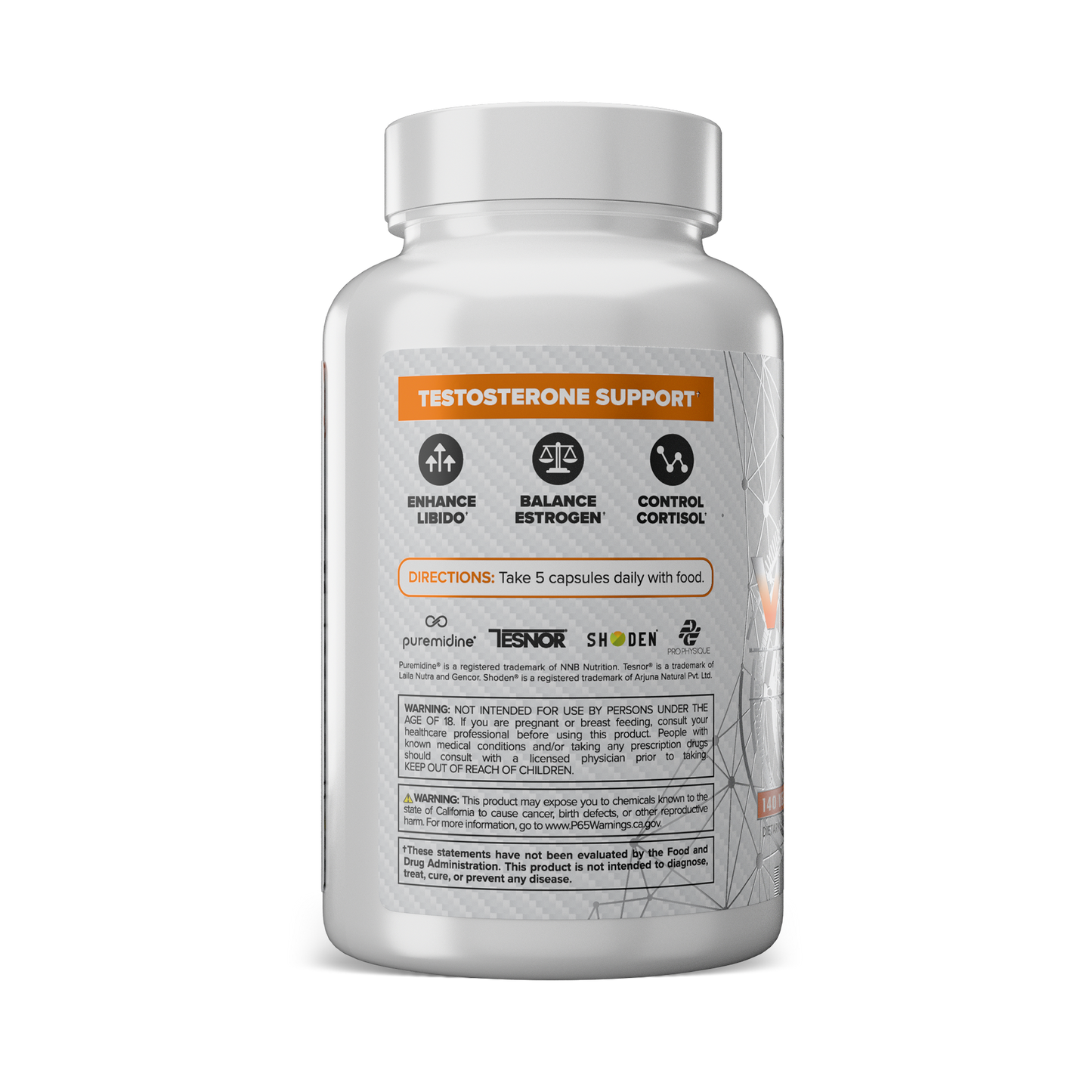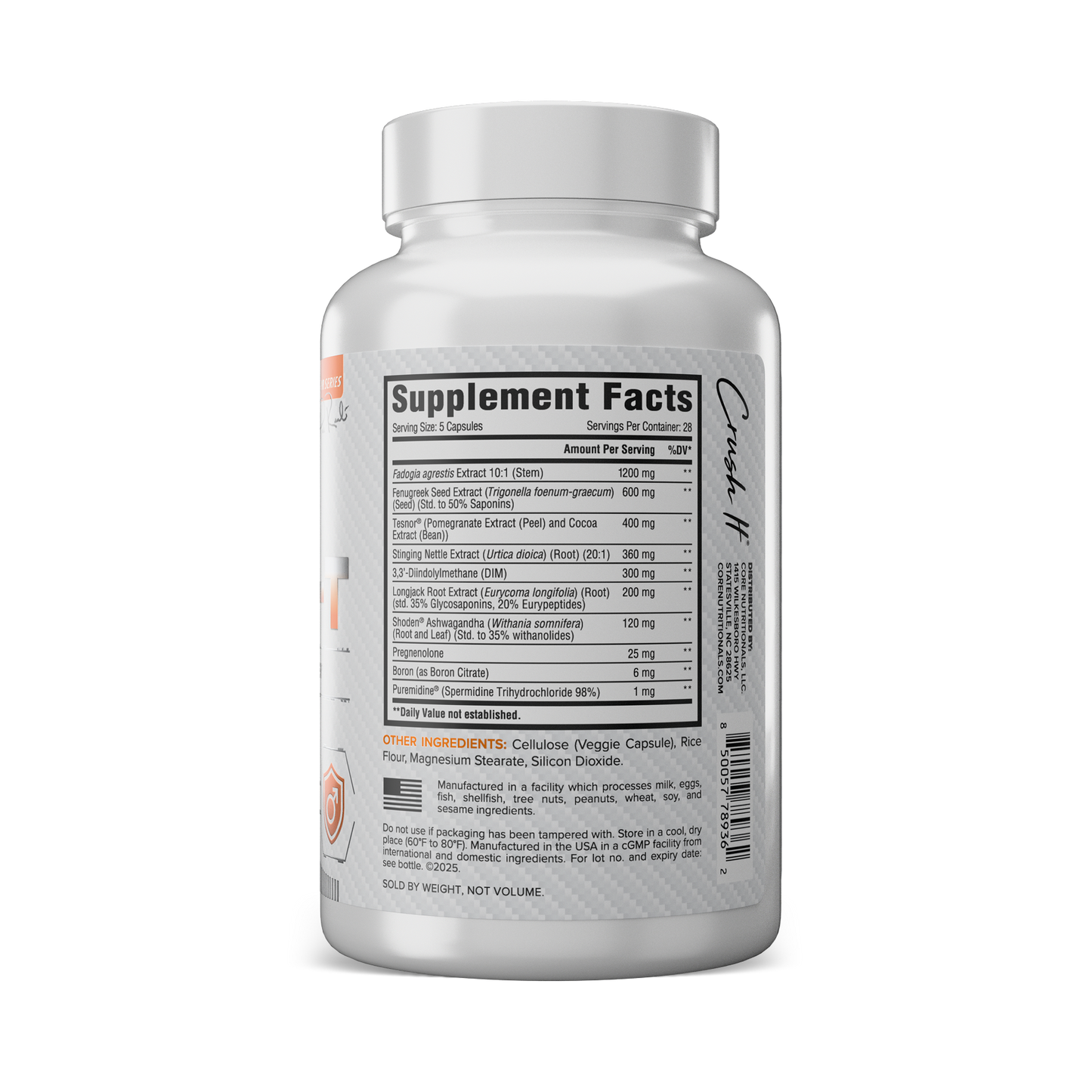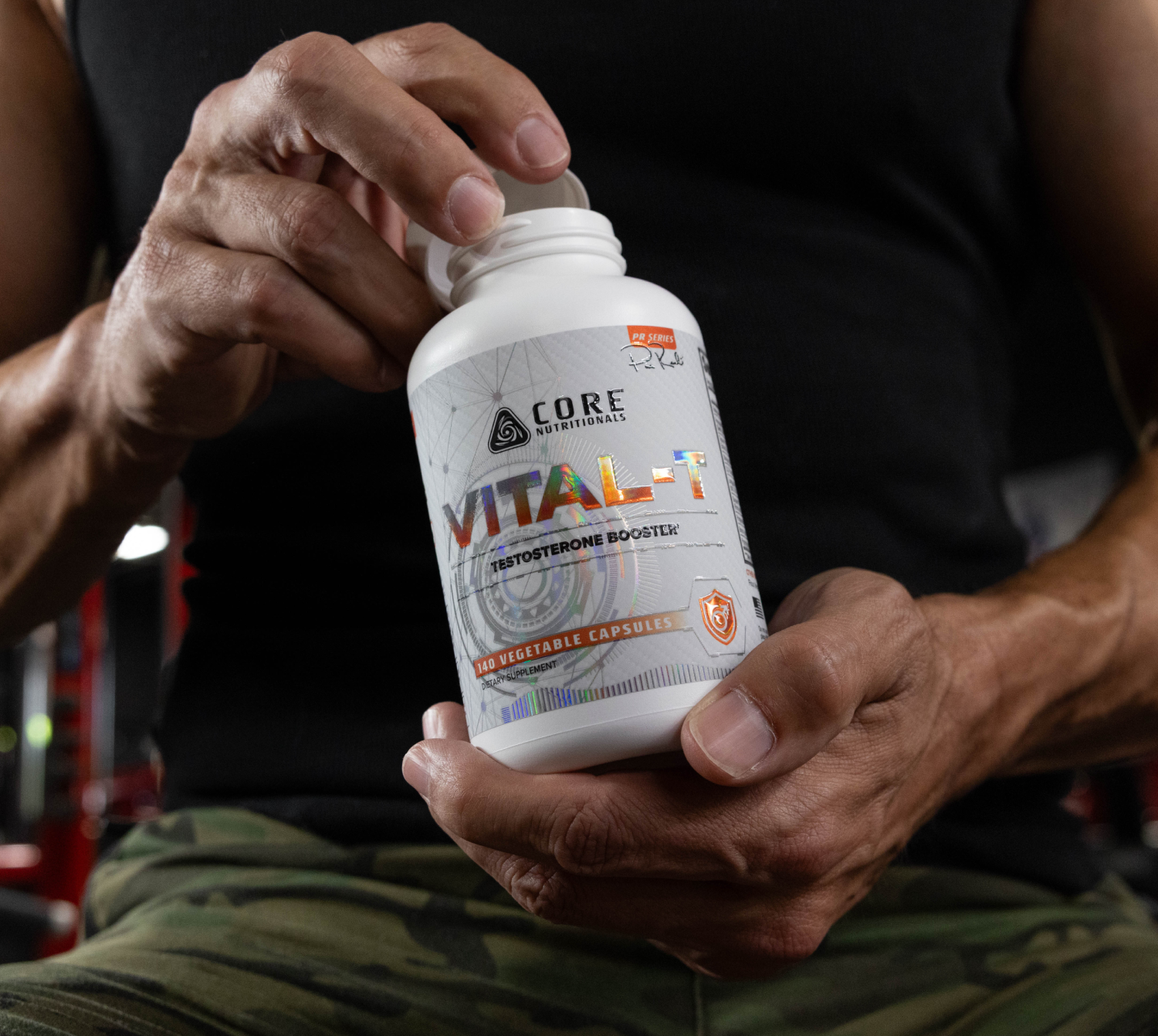



Testosterone Booster
-
Fadogia agrestis Extract 10:1 (SteM)
Fadogia agrestis, a shrub native to West Africa, has been used in traditional medicine for centuries to support male vitality and performance. Today, science is beginning to validate what has been long believed—that Fadogia may play a role in supporting healthy testosterone levels. Standardized in a potent 10:1 extract, the concentration of bioactive compounds in Fadogia agrestis is significantly enhanced, making it more effective at delivering results in an efficient dose
One of the most exciting aspects of Fadogia agrestis is its potential to stimulate natural testosterone production. Preclinical studies suggest that it may act on the hypothalamic–pituitary–gonadal (HPG) axis, encouraging the release of luteinizing hormone (LH), a key signal for the testes to produce more testosterone. This makes Fadogia unique in that it doesn't just supply precursors—it may help your body generate more of its own testosterone through endocrine stimulation.
Higher testosterone levels can translate into benefits such as improved energy, muscle strength, recovery, and libido. Athletes and other active individuals often look towards Fadogia as a natural, non-hormonal way to support elevated performance, drive, and optimal hormonal balance. When paired with other natural testosterone-supporting compounds like Tongkat Ali, or Boron, Fadogia agrestis extract can be a powerful addition to a well-rounded hormone health stack.
While more human research is needed the results shown thus far are promising and have made Fadogia a standout in the world of natural testosterone support.
Fenugreek Seed Extract (Trigonella foenum-graecum) (Seed) (Std. to 50% Saponins)
Fenugreek seed extract, derived from Trigonella foenum-graecum, is a time-tested botanical with a rich history in both traditional medicine and modern sports nutrition. When standardized to 50% saponins—the primary active compounds responsible for many of its benefits—fenugreek is widely used to support healthy testosterone levels, enhance physical performance, and aid in muscle recovery and body composition improvements.
One of fenugreek’s most notable features is its potential to support free testosterone levels. While total testosterone is important, free testosterone is the biologically active form that directly influences strength, libido, muscle growth, and mood. Studies have shown that fenugreek extract may inhibit enzymes such as aromatase and 5-alpha-reductase, which can convert testosterone into estrogen and DHT respectively. By minimizing this hormonal conversion, fenugreek may help maintain a healthier balance of testosterone in the bodY.
Clinical research studies also support fenugreek’s ability to enhance strength and body composition. In several studies involving resistance-trained men, supplementation with fenugreek extract led to improvements in strength, lean muscle mass, and reductions in body fat—without causing significant hormonal imbalances or side effects. Additionally, its high saponin content may contribute to enhanced glycogen resynthesis, helping athletes recover faster after intense training.
Beyond its performance benefits, fenugreek is also widely valued for supporting metabolic health. It has been studied for its potential role in promoting healthy blood sugar levels and improving insulin sensitivity—factors that are increasingly recognized as crucial to hormonal health and longevity.
Tesnor® (Pomegranate Extract (Peel) and Cocoa Extract (Bean))
Tesnor®, a clinically studied proprietary blend of Punica granatum (pomegranate) peel and Theobroma cacao (cocoa) seed extracts, was specifically formulated to support healthy testosterone levels, muscle strength, and overall male vitality, especially in aging males. Tesnor® sets itself apart with is its dual-action mechanism—supporting both free and total testosterone levels—while also promoting muscle protein synthesis and reducing markers of oxidative stress.
In a randomized, double-blind, placebo-controlled clinical study, Tesnor® supplementation led to a significant increase in total testosterone by 22% and free testosterone by 19% in healthy men over an 8-week period. This is believed to be due to Tesnor’s ability to modulate the activity of enzymes such as 5-alpha-reductase and aromatase, which are responsible for the conversion of testosterone to dihydrotestosterone (DHT) and estrogen, respectively. By supporting a favorable testosterone-to-estrogen balance, Tesnor® can help maintain anabolic hormone levels while reducing the risk of estrogen dominance or excessive DHT conversion.
Additionally, Tesnor® has shown promise in improving muscle strength and performance metrics. In supporting clinical trials, participants experienced statistically significant improvements in handgrip strength and leg press performance—suggesting Tesnor’s application as a promising performance enhancer alongside traditional training and supplementation protocols. It can also support nitric oxide production and enhance overall blood flow, further contributing to athletic performance and sexual health.
Diving deeper, the polyphenols in pomegranate and cocoa can offer potent antioxidant and anti-inflammatory properties, which may help reduce oxidative damage to Leydig cells—the cells in the testes responsible for testosterone production. This protective effect could support longer-term hormonal health, especially in aging males facing age-related testosterone decline.
Tesnor® represents a natural, evidence-backed ingredient for boosting testosterone, improving physical performance, and promoting overall male wellness. With its combination of clinically validated ingredients and multiple mechanisms of action, it serves as a great compliment to the other clinically backed ingredients found in this VITAL-T formulation.
Stinging Nettle Extract (Urtica dioica) (Root) (20:1)
Stinging nettle (Urtica dioica), an herb that has been traditionally used for centuries in medicine, has been subject to recent scientific interest for its potential benefits for hormonal health—particularly its role in supporting testosterone levels in men. While stinging nettle doesn't directly increase testosterone production, it exerts several key effects that can help maintain optimal levels of free (bioavailable) testosterone.
One of the most well-documented mechanisms of action by which stinging nettle supports testosterone is through its inhibition of sex hormone-binding globulin (SHBG). SHBG binds to testosterone in the bloodstream, leaving it inactive. Specific compounds in stinging nettle—particularly lignans found in the root—have been shown in vitro to bind to SHBG, potentially displacing testosterone and allowing for a greater proportion of it to remain free and active. This increase in free testosterone can translate to improved strength, vitality, libido, and mood in men.
Additionally, stinging nettle has been studied for its anti-inflammatory and anti-aromatase effects. Aromatase is the enzyme responsible for converting testosterone into estrogen. By inhibiting this enzyme it may help preserve testosterone levels, particularly in aging men who are more susceptible to this conversion. In one study published in Planta Medica, nettle root extract exhibited mild aromatase-inhibiting activity, supporting its potential role in hormone balance.
Finally, stinging nettle may also support prostate health, another important consideration for aging men and those concerned with long-term hormonal optimization. Several clinical studies have shown that nettle root extract, when used alone or in combination with saw palmetto, can help alleviate lower urinary tract symptoms associated with benign prostatic hyperplasia (BPH), without adversely affecting testosterone levels.
3,3-Diindolylmethane (DIM)
What we typically refer to as “Estrogen,” is in fact a group of three biologically distinct hormones – estradiol (E2), estrone (E1), and estriol (E3), each possessing different activities in different cell, tissue, and receptor types. When experts refer to either the benefits or downfalls of “estrogen," they really mean to (but probably cannot) identify a specific estrogen.
These specific estrogens, in turn, metabolize into even more specific estrogen sub-compounds, such as the 2-hydroxyestrogens (2-OHE’s), 2-methoxyestrogens, 16a-hydroxyestrone (16-OHE1), and 4-hydroxyestrogens (4-OHE’s). As their parent estrogens, these estrogen metabolites exert different effects depending upon the tissue and cell one is examining. In fact, two estrogen metabolites in particular, 16-OHE1 and 2-OHE, have such contrasting cellular activities that 2-OHE is an estrogen antagonist. Yes, that is correct: there is an anti-estrogen, estrogen.
In recent years, so-called “phytonutrients” have become the focus of clinical research, as these natural compounds have shown the ability to increase the ratio of good, estrogen decreasing estrogens (such as 2-OHE), to bad, estrogen increasing estrogens (such as 16-OHE1). One of these phytonutrients, a dietary indole known as indole-3-carbinol (I3C), is the bioactive phytochemical and a presumed modulator of reduced cancer risk in areas with high cruciferous vegetable consumption. Unfortunately, despite its potent antiestrogenic activity, I3C is highly molecularly unstable, and therefore unsuitable for use as a therapeutic agent or dietary supplement.
Luckily, however, I3C readily metabolizes into the secondary indole 3,3’ diindolylmethane, or DIM for short. When used in a supplemental fashion in clinical trials, DIM appears to possess all the positive effects of its parent compound with respect to antiestrogenic action – promoting the metabolism of beneficial estrogens that themselves reduce estrogenic activity.
Aside from its healthy estrogen promoting abilities, DIM also exerts its own direct physiological effects, including:
- Promoting pathways of internal estrogen metabolism that favor the production of anti-estrogen estrogens.
- Adjusting the activity of certain cytochrome enzymes, reducing the activity at the estrogen receptor site.
- Limit the cell division and growth of certain estrogens.
Despite the bodybuilding community’s single-minded crusade to eliminate estrogen wherever it lies in wait, compounds such as DIM show us that estrogen is a very diverse set of compounds – and that we should actively pursue increasing certain estrogens that have beneficial, and ironically, anti-estrogenic effects.
Longjack Root Extract (Eurycoma longifolia) (Root) (std. 35% Glycosaponins, 20% Eurypeptides)
The name Eurycoma longifolia is probably familiar to most within the bodybuilding and fitness community, as it has a long history of use as an aphrodisiac supplement. Also known as Tongkat Ali, Malaysian Ginsgeng, and Longjack, the herb is found in temperate regions of Southeast Asia and has been used for centuries as an aphrodisiac in medicinal systems local to those regions.
Western research has begun to establish that Eurycoma longifolia’s does in fact have an effect on libido, in both animal and human trials. Over the past several decades, numerous in vivo animal and human studies have been conducted to further explore Eurycoma longifolia’s effect on the management of sexual disorders, infertility, low libido, and low testosterone levels. A large majority of these studies have gathered enough evidence to conclude that Eurycoma longifolia use in the support of improving these outcomes is an acceptable rationale. While the exact mechanism of action is somewhat unclear, it is suggested that it helps to restore normal testosterone levels through increasing the release of free testosterone from its binding hormone, sex hormone-binding globulin.
Benefits from an increase in testosterone levels can include higher physical vigor and strength as well as increased vitality and cortisol management.
Though more research is required to establish Tongkat’s aphrodisiac and/or pro-erectile effects in humans, the existing animal research is fairly consistent in suggesting the herb’s effects in these areas.
Shoden® Ashwagandha (Withania somnifera) (Root and Leaf) (std. to 35% withanolides)
Withania somnifera Dunal, colloquially known as Winter Cherry or Indian Ginseng, is an herb that features prominently in the traditional Indian medicinal system of Ayurveda. Known as Ashwagandha in Ayurveda, Withania somnifera is a critical ingredient in various Ayurvedic tonics and tinctures prepared as a traditional remedy for the treatment of various ailments.
Recently identified as a potent adaptogenic and target for therapeutic applications, Ashwagandha has been the subject of numerous animals, pre-clinical, and clinical trials designed to examine its potential effects as an antioxidant, anti-carcinogenic, anxiolytic, antibacterial, antifungal, and immunomodulating compound. Ashwagandha’s broad therapeutic potential is hypothesized to be the result of its robust phytochemical profile, including a wide swath of alkaloids, sitoindosides, and the highly biologically active withanolide group. As the principally biologically active compounds within Ashwagandha, withanolides such as withanone, withaferine A, withanolides A, D, and G have been identified, isolated, and extensively studied in the various applications noted above.
Core Nutritionals selected the potent Shoden® Ashwagandha Extract due to these potential physiological benefits of withanolides to include in its Stabilize for Men formula. Shoden® is a full-spectrum Ashwagandha extract, standardized with 35% withanolides. Shoden® offers a very high bioavailability and demonstrated optimal activity even at low doses.
The high concentrations of withanolides within Shoden® has resulted in encouraging results in a number of human, clinical trials looking at the benefits on aerobic and anaerobic physical activity. In several randomized, double blinded, placebo-controlled studies, Shoden® Ashwagandha showed positive impacts on reduction of stress induced cortisol, power output, rate of perceived exertion, capillary lactate levels, and oxygen intake (VO2 max). Shoden® has also shown increases in DHEA-S and testosterone in men when supplemented.
Though each of these results is impressive, perhaps the most significant is reduction in cortisol. As detailed above, cortisol possesses a multitude of potentially degradative physiological effects, including: inhibiting glucose uptake, causing a constriction of the vasculature (vasoconstriction), the breakdown of glycogen, and inarguably the result most would desire to avoid, proteolysis (the breakdown of muscle tissue).
Pregnenolone
Pregnenolone is a naturally occurring steroid hormone and a critical precursor in the biosynthesis of other hormones, including testosterone, DHEA, progesterone, and cortisol. Often referred to as the "mother hormone," pregnenolone plays a foundational role in maintaining an optimally functioning endocrine system. By replenishing or supporting pregnenolone levels, it's possible to positively influence the hormonal cascade that ultimately supports healthy testosterone production, especially in individuals experiencing age-related hormonal decline or chronic stress.
Pregnenolones mechanism of action for supporting testosterone lies in its role as an upstream precursor in the steroidogenic pathway. Synthesized primarily in the mitochondria of the adrenal glands and to some extent in the gonads and brain, pregnenolone is derived from cholesterol. From there, it can be converted into DHEA (dehydroepiandrosterone), which then serves as a direct precursor to both androstenedione and testosterone. This pathway suggests that supplementing with pregnenolone may help provide the raw materials necessary for endogenous testosterone synthesis, especially when the body is under stress or lacking in critical hormonal substrates.
Beyond its role in testosterone synthesis, pregnenolone is also known for its neurosteroidal effects. It has been shown to influence memory, mood, and overall cognitive performance by modulating GABA and NMDA receptors in the brain. This is particularly relevant because chronic psychological stress and poor sleep — both of which pregnenolone may help regulate — are known to suppress testosterone levels. Therefore, pregnenolone may indirectly support testosterone production by helping the body better manage stress and maintain a favorable neuroendocrine environment.
Pregnenolone can offer a foundational approach to testosterone support by supporting the hormonal structure needed for healthy androgen production, making it a potentially valuable addition to a comprehensive hormone optimization protocol, especially for those focused on longevity, stress resilience, and endocrine balance.
Boron (as Boron Citrate)
Boron is a mineral present in multiple fruits, vegetables, tubers, and drinking water, though it is not widely accepted as either an essential mineral or essential vitamin. Boron affects a few physiological functions in the body, particularly modulating hormonal homeostasis.
While still emerging, recent data suggest that boron may play a role in potentiating free testosterone levels in healthy men. In one study, otherwise healthy men were provided an acute serving of boron and had their free and total levels of testosterone, alone with SHBG (sex hormone binding globulin) and DHT (dihydrotestosterone) levels measured. In that study, total testosterone was unaltered, but free testosterone was enhanced by 14%, while SHBG was significantly (9%) reduced. Boron has also shown substantial evidence in playing a role in supporting normal prostate function, specifically through lowering PSA (prostate specific antigen), which can be a marker for prostate abnormality advancement. Other studies have shown the effectiveness of adequate boron levels on optimizing prostate health. One human study concluded that men who ingested the greatest amount of boron in their diet were 54% less likely to be at risk of prostate related issues when compared to the lowest intake.
Puremidine® (Spermidine Trihydrochloride 98%)
Spermidine, a naturally occurring polyamine found in foods like wheat germ, soybeans, and aged cheese, has gained popularity for its powerful cellular health and longevity-promoting properties. Puremidine® is a high-purity, clinically researched form of spermidine designed to deliver consistent, bioavailable doses. While spermidine is not a traditional testosterone booster, emerging evidence suggests it may support testosterone production indirectly by optimizing key cellular processes, particularly autophagy, mitochondrial function, and inflammation regulation.
The primary mechanism of action for spermidine is its ability to stimulate autophagy—the body’s process of cleaning out damaged cells and regenerating newer, healthier ones. This cellular renewal process is crucial for optimal function of testosterone-producing cells, especially the Leydig cells in the testes. Autophagy supports mitochondrial efficiency and reduces oxidative stress, both of which are essential for maintaining the energy-demanding process of steroidogenesis (testosterone synthesis). In essence, spermidine helps maintain the health and functionality of the very cells responsible for producing testosterone.
Additionally, spermidine has been shown to reduce systemic inflammation and support metabolic health, both of which are closely linked to hormonal balance. Chronic inflammation and metabolic dysfunction (e.g., insulin resistance) can impair the hypothalamic-pituitary-gonadal (HPG) axis and suppress testosterone production. By improving mitochondrial integrity and reducing pro-inflammatory cytokines, spermidine may help restore hormonal homeostasis and enhance the body’s responsiveness to luteinizing hormone (LH), the signal that stimulates testosterone synthesis.
-






